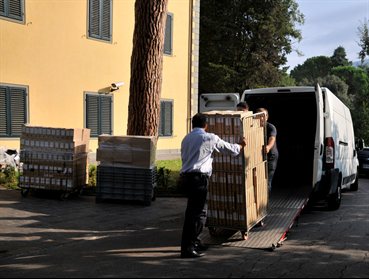Posted on 13 September 2012
The Historical Archives of the European Union’s (HAEU) reading room will be closed until early October while the collection moves to Villa Salviati.
 The archives are being transported from their present home at nearby Villa Il Poggiolo to the new site, where 10km of underground shelving has been build following extensive renovation. A much larger reading room will also be available from early October.
The archives are being transported from their present home at nearby Villa Il Poggiolo to the new site, where 10km of underground shelving has been build following extensive renovation. A much larger reading room will also be available from early October.
“The state-of-the-art facility has double the space,” says HAEU Director Jean-Marie Palayret. “A prestigious building is always important for an archive because history and archives are linked, and a prestigious historical building is important to help attract the public.”
New temperature-controlled tunnels have been built to store the records, with allowances made for paper acidity and automated-extinguishers which extract oxygen from the air in case of fire. Due to the documents’ vulnerability they are viewable on microfilm, while gradually moving to electronic format.
The HAEU was opened in 1985 to house archives of key institutions including the Council of Ministers, the European Parliament and the European Commission. It has since been expanded to include the private papers of leading political figures, pressure groups and other organisations such as the ESA and OECD.
The series of private archives include those of Altiero Spinelli, a driving force behind European integration, and Paul-Henri Spaak, former president of the Common Assembly of the European Coal and Steel Community (ECSC) which preceded the EU. There are also hundreds of oral interviews with high officials and historians reflecting on the region’s integration. Records of the European Court of Justice, European Central Bank and the Committee of Regions are due to be added in the future.
The HAEU is funded by the EU and administered by the EUI, a unique international centre for doctorate and post-doctorate research, founded in 1972 by the six founding member states of the European Communities.
For more information please contact Agnès Brouet: [email protected]
(Text by Rosie Scammell)